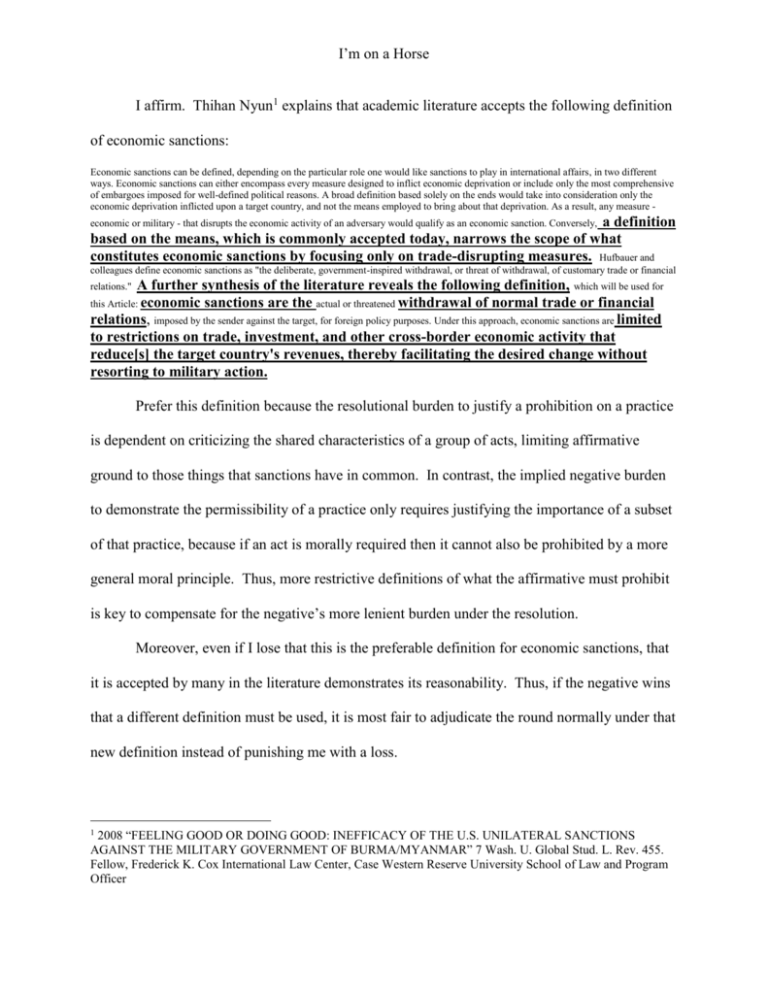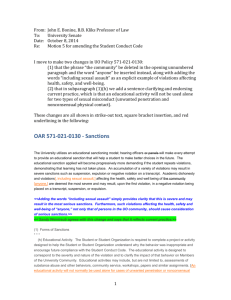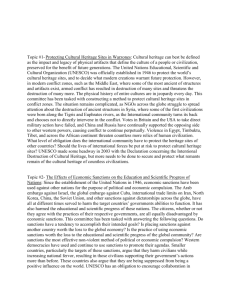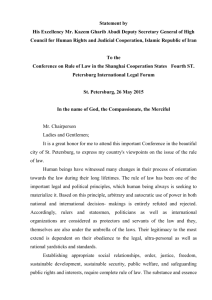For British Eyes Only
advertisement

I’m on a Horse I affirm. Thihan Nyun1 explains that academic literature accepts the following definition of economic sanctions: Economic sanctions can be defined, depending on the particular role one would like sanctions to play in international affairs, in two different ways. Economic sanctions can either encompass every measure designed to inflict economic deprivation or include only the most comprehensive of embargoes imposed for well-defined political reasons. A broad definition based solely on the ends would take into consideration only the economic deprivation inflicted upon a target country, and not the means employed to bring about that deprivation. As a result, any measure - a definition based on the means, which is commonly accepted today, narrows the scope of what constitutes economic sanctions by focusing only on trade-disrupting measures. Hufbauer and economic or military - that disrupts the economic activity of an adversary would qualify as an economic sanction. Conversely, colleagues define economic sanctions as "the deliberate, government-inspired withdrawal, or threat of withdrawal, of customary trade or financial A further synthesis of the literature reveals the following definition, which will be used for this Article: economic sanctions are the actual or threatened withdrawal of normal trade or financial relations, imposed by the sender against the target, for foreign policy purposes. Under this approach, economic sanctions are limited to restrictions on trade, investment, and other cross-border economic activity that reduce[s] the target country's revenues, thereby facilitating the desired change without resorting to military action. relations." Prefer this definition because the resolutional burden to justify a prohibition on a practice is dependent on criticizing the shared characteristics of a group of acts, limiting affirmative ground to those things that sanctions have in common. In contrast, the implied negative burden to demonstrate the permissibility of a practice only requires justifying the importance of a subset of that practice, because if an act is morally required then it cannot also be prohibited by a more general moral principle. Thus, more restrictive definitions of what the affirmative must prohibit is key to compensate for the negative’s more lenient burden under the resolution. Moreover, even if I lose that this is the preferable definition for economic sanctions, that it is accepted by many in the literature demonstrates its reasonability. Thus, if the negative wins that a different definition must be used, it is most fair to adjudicate the round normally under that new definition instead of punishing me with a loss. 2008 “FEELING GOOD OR DOING GOOD: INEFFICACY OF THE U.S. UNILATERAL SANCTIONS AGAINST THE MILITARY GOVERNMENT OF BURMA/MYANMAR” 7 Wash. U. Global Stud. L. Rev. 455. Fellow, Frederick K. Cox International Law Center, Case Western Reserve University School of Law and Program Officer 1 I’m on a Horse Finally, prefer reasonable aff definitions absent actual substantial abuse because shifting definitions in the middle of the round dissolves the full 1AC strategy and 6 minutes of affirmative speech time which is a far greater loss to the affirmative than the use of a reasonable definition is to the negative. Ought is “used to express justice, moral rightness, or the like”2, so I value morality. Morality finds its basis in the absolute value of persons as ends in themselves. This necessarily follows from the value that each individual finds in herself, insofar as she is capable of rational self-reflection. Kant3 writes, The ends which a rational being proposes to himself at pleasure as effects of his actions (material ends) are all only relative, for it is only their relation to the particular desires of the subject that gives them their worth, which therefore cannot furnish principles universal and necessary for all rational beings and for every volition, that is to say practical laws. Hence all these relative ends can give rise only to hypothetical imperatives. Supposing, however, that there were something whose existence has in itself an absolute worth, something which, being an end in itself, could be a source of definite laws; then in this and this alone would lie the source of a possible categorical imperative, i.e., a practical law. Now I say: man and generally any rational being exists as an end in himself, not merely as a means to be arbitrarily used by this or that will, but in all his actions, whether they concern himself or other rational beings, must be always regarded at the same time as an end. All objects of the inclinations have only a conditional worth, for if the inclinations and the wants founded on them did not exist, then their object would be without value. But the inclinations, themselves being sources of want, are so far from having an absolute worth for which they should be desired that on the contrary it must be the universal wish of every rational being to be wholly free from them. Thus the worth of any object which is to be acquired by our action is always conditional. Beings whose existence depends not on our will but on nature's, have nevertheless, if they are irrational beings, only a relative value as means, and are therefore called things; rational beings, on the contrary, are called persons, because their very nature points them out as ends in themselves, that is as something which must not be used merely as means, and so far therefore restricts freedom of action (and is an object of respect). These, therefore, are not merely subjective ends whose existence has a worth for us as an effect of our action, but objective ends, that is, things whose existence is an end in itself; an end moreover for which no other can be substituted, which they should subserve merely as means, for otherwise nothing whatever would possess absolute worth; but if all worth were conditioned and therefore contingent, then there would be no supreme practical principle of reason whatever. If then there is a supreme practical principle or, in respect of the human will, a categorical imperative, it must be one which, being drawn from the conception of that which is necessarily an end for everyone The foundation of this principle is: rational nature exists as an end in itself. Man necessarily conceives his own existence as being so; so far then this is a subjective principle of human actions. But every other rational being regards its existence similarly, just on the same rational principle that holds for me: so that it is at the same time an objective principle, from which as a supreme practical law all laws of the will must be capable of being deduced. Accordingly the practical imperative will be as follows: So act as to treat humanity, whether in thine own person or in that of any other, in every case as an end withal, never as means only. We will now inquire whether this can be practically carried out. because it is an end in itself, constitutes an objective principle of will, and can therefore serve as a universal practical law. “ought” Dictionary.com Unabridged. Random House, Inc. “Groundwork for the Metaphysics of Morals” translated by Thomas Abbott http://evansexperientialism.freewebspace.com/kant_groundwork_metaphysics_morals01.htm 2 3 I’m on a Horse This constraint on not treating people instrumentally must be maintained, even when doing so could stop a greater number of violations. This is necessary to maintain the inviolable status of persons. Michael Otsuka4 summarizes F.M. Kamm, Kamm's own [the] justification of constraints focuses on facts about the status of the potential victims of rights violations rather than facts about the agent who would-violate the constraint. Her view is that constraints are justified because they reflect our elevated moral status as persons who are inviolable insofar as it is impermissible to sacrifice any one of us in order to realize the greater good of minimizing the violation of constraints. Our moral status as inviolable beings is greater than it would have been if it were legitimate to sacrifice any one of us for the sake of minimizing evil. Kamm emphasizes that [because] the impermissibility of violating one person's constraint for the sake of preventing more of the same type of constraint from being violated does not imply the permissibility of the constraint violations that one is not permitted to prevent. Hence, even if we are, statistically speaking, more likely to be killed as a means when there are constraints against minimizing constraint violations, we are, morally speaking, less violable insofar as there are fewer constraints that it is permissible to violate. Moreover, because this moral requirement is derived from the moral status of those who would be harmed, particularities of the acting agent are not relevant. Even if states accrued additional obligations than those possessed by individuals, these obligations would not carry the same primary moral status of those that exist outside of social contingencies and human creation, because preexisting moral requirements constrain the voluntary formation of new obligations. Thus, the criterion is rejecting the instrumental harming of innocents, defined as causing undeserved harm to people as a means to achieve an external end. I contend that economic sanctions violate this constraint. “Review: Kamm on the Morality of Killing” The University of Chicago Press Reviewed work(s): Morality, Mortality, Vol. 2, Rights, Duties, and Status. by Frances M. Kamm Ethics, Vol. 108, No. 1 (Oct., 1997), pp. 197-207 http://www.jstor.org/stable/2382094 4 I’m on a Horse First, The logic inherent to economic sanctions necessitates that harming innocents be an instrumental goal, as it is only the suffering of people within the country that pressures the government to alter its policies. Joy Gordon5 agrees, Although the doctrine of double effect would seem to justify ‘collateral damage,’ it does not offer a justification of sanctions. ‘Collateral damage’ entails the unintended secondary harm to civilians. If a bombing raid is conducted against a military base, the collateral damage would be that the schoolhouse half a mile away was destroyed by a bomb that missed its intended target, which was the military base. In that case, the bombing raid would be equally successful if the base were hit, and the schoolhouse were undamaged. But the damage done by indirect sanctions is not in fact ‘collateral,’ in that the damage to the civilian population is necessary and instrumental. The direct damage to the economy is intended to indirectly influence the leadership, by triggering political pressure or uprisings of the civilians, or by generating moral guilt from the ‘fearful spectacle of the civilian dead.’ Sanctions directed against an economy would in fact be considered unsuccessful if no disruption of the economy took place. We often hear commentators objecting that ‘sanctions didn't work’ in one situation or another because they weren't ‘tight’ enough -- they did not succeed in disrupting the economy. Thus, sanctions are not defensible under the doctrine of double effect. Although the end may indeed be legitimate, [because] the intended intermediate means consists of the generalized damage to the economy, which violates both the first and second requirements of the doctrine. Second, even if individual sanctions don’t harm innocents, this is merely coincidental to the strategic demands of that particular situation, and do not belie the necessity of prohibiting economic sanctions. A. Absent a division between strategic and tactical decisions, there is no way to ensure that nations will not use the sanctions that instrumentally harm innocents. Mathew Craven 1 6 establishes the division, There is, however, a reason to worry about this issue, which is not simply related to the question whether economic measures can be regarded as strictly analogous to measures involving armed force. The divisional categorization of the law of armed conflict into the jus in bello on the one hand, and the jus ad bellum on the other, is premised upon the belief that the humanitarian objectives of the former should not be made conditional upon the legitimacy or otherwise of recourse to force. The lawfulness of recourse to violence on the part of either party, in other words, is regarded as independent of the requirement that they In order to effectively separate these two arenas of inquiry, the law of armed conflict relies upon the sociological observation that armed conflict is actually taking place. Once the existence of armed conflict becomes (or their opponents) should conduct themselves in a humane way. 5 ECONOMIC SANCTIONS, JUST WAR DOCTRINE, AND THE "FEARFUL SPECTACLE OF THE CIVILIAN DEAD”: Sanctions, like siege, intend harm to civilians and therefore cannot be justified as a tool of warfare. by Joy Gordon http://www.crosscurrents.org/gordon.htm Cross Currents, Fall 1999, Vol. 49 Issue 3. 6 “Humanitarianism and the Quest for Smarter Sanctions” EJIL (2002), Vol. 13 No. 1, 43–61 2002 (Reader in International Law, University of London.) I’m on a Horse the presumptive backdrop, the focus of inquiry is largely limited to an analysis of a tactical rather than a strategic nature. B. Economic sanctions, unlike military force, have no situational backdrop to allow for a strict division between questions of legitimate strategic and tactical decisions. Craven 27 furthers: Rather than address the broad necessity of armed force as one of many strategic responses to a particular threat, attention falls instead upon tactical questions such as how that force is used and against whom. If this structure of reasoning were to be applied, by analogy, to the case of economic sanctions, it would suggest that one should maintain an agnosticism as to the legitimacy of recourse to sanctions, and focus rather upon refining them as an institution in order to minimize the collateral damage. This, in a sense, is exactly what ‘targeting’ sanctions and introducing sufficient humanitarian exemptions is all about. It also incidentally conforms to most current views as to the structure of Articles 39 and 41 of the Charter. The problem this poses is that, unlike a case of armed conflict in which the use of military force provides the situational backdrop, there is no similar conditioning assumption in the event of sanctions (apart from what may be deduced from the observation that international peace and security have been threatened) and it becomes far more difficult to distinguish between the two levels of decision-making — the strategic and the tactical — for the purpose of articulating the point at which humanitarian arguments may have salience. Since an argument as to the (strategic) necessity of sanctions will inevitably involve certain assumptions as to both the type and likely effect of the measures to be adopted (i.e. tactical questions), and vice versa [i.e.] (an argument as to the type of sanctions to be deployed will depend upon an evaluation of their relative efficacy), humanitarian arguments will constantly be in danger of being overridden by an expanded understanding of what is actually necessary in the circumstances. The complaint that comprehensive economic sanctions in the case of Iraq are inhumane, for example, might naturally argue in favor of an alternative course of action that does not involve targeting the economy as a whole. It is clear, however, that so long as one can effectively continue to argue that comprehensive economic sanctions are a strategic necessity (that they are the best course of action in the circumstances), humanitarian arguments can only operate within the remaining space (such as in requiring sufficiently extensive exemptions, or in advancing the desirability of humanitarian aid). A reliance upon the argumentative structure of humanitarian law, therefore, effectively normalizes the institution of sanctions (of whatever nature), just as the existence of armed conflict is presumed for purposes of application of the jus in bello. In such a context, the cause of humanitarianism is forced to follow, and become entirely subordinate to, the cause of maintaining the peace, and far from exercising a substantive restraint upon the choice of measures to be adopted, merely serves to palliate the concern of those who dislike the idea that coercive measures are harmful. Thus, we can never ensure that sanctions do not violate the constraint on instrumentally harming innocents unless they are categorically banned. “Humanitarianism and the Quest for Smarter Sanctions” EJIL (2002), Vol. 13 No. 1, 43–61 2002 (Reader in International Law, University of London.) 7 I’m on a Horse C. This inability to operate within the jus ad bellum / in bello distinction opens the door to devastating utilitarian consequences. Robert Sloane8 writes, Law can control conduct by, among other strategies, prohibition and regulation. The law of war, including the jus ad bellum and the jus in bello, uses both strategies. The [First,] jus ad bellum tries to minimize resort to force in the first prohibiting it except for self-defense and force authorized by the Security Council. But contemporary international law recognizes that, historically, the prohibition strategy has been—at best and charitably— partially successful. Since the late nineteenth century, the law of war has therefore focused increasingly on regulation: first, by elaborating flexible in bello principles of military necessity, proportionality, and discrimination; second, by dictating that, whatever the utilitarian calculi, some tactics, such as torture, should be absolutely prohibited; and third, by regulating the scope or intensity of force by means of customary principles of ad bellum necessity and proportionality. The dualistic axiom is indispensable to the efficacy of the law of war, such as it may be, because it theoretically ensures that relatively common, though debatable, ad bellum violations (that is, violations of the prohibition strategy) do not obviate or diminish the force of the regulatory strategy. As this Article suggests, however, modernity has witnessed an erosion of the dualistic axiom. In part, place by this reflects the practical pressures brought to bear on the law of war by advances in technology, geopolitical reconfiguration following the Cold War, and evolution in the nature of war itself. To retain relevance and potential efficacy, the law must candidly acknowledge and adapt to these changes, not elide them, as has the ICJ. It must also clarify the law’s regulatory constraints, especially proportionality, with far more analytic rigor than it has to date. I do not mean we should abandon the strategy of prohibition, as some suggest. I agree with appropriately qualified views that, for all its failings, the U.N. Charter framework prohibiting war as a general tool of statecraft diminishes the aggregate level of unauthorized coercion.361 But it would be advisable for international law to focus also, and more deliberately, on refining the ad bellum and in bello regulatory strategies to meet the new geostrategic, military, and technological developments in warfare in the twenty-first century. To conclude, I therefore want to propose four clarifications or refinements of the dualistic axiom. As the dualistic axiom traditionally insists, ad bellum judgments should neither obviate nor modify in bello obligations. This means, first, that [Second, transforming] in bello constraints of a deontological, absolute nature must not be transformed sub silentio into contingent norms that may, in circumstances characterized as supreme emergency or otherwise, be subjected to consequentialist calculi. That change seems, as argued earlier, to reflect an anachronistic view that ascribes moral value to states as states, whereas contemporary international law regards people, not states, as the fundamental unit of value. It would also introduce into the law self-serving, oft-politicized judgments about the comparative value of polities. Whatever their truth, judgments of this kind degrade the jus in bello. Finally, [Third,] this change could not be limited in practice to only certain polities. Again, if the international law against torture, for example, depends on who does it, or on under what circumstances, then, given how international law operates, there is no law against torture. Those who would change the absolute nature of certain in bello constraints may therefore want to [should] consider the longterm, aggregate, and systemic consequences of such a change. For just as such changes cannot be limited to some polities but not others, neither can their scope be limited only to exigency. Torture, to stick with the same (regrettably timely) example, has a documented metastatic tendency, as the Abu Ghraib scandal illustrates.362 The same goes for other in bello violations justified by supreme emergency theory. http://www.bu.edu/law/faculty/scholarship/workingpapers/2008.html “The Cost of Conflation: Preserving the Dualism of Jus ad Bellum and Jus in Bello in the Contemporary Law of War” 12/29/08 - Associate Professor of Law, Boston University Law School 8 I’m on a Horse The harms from subjecting in bello constraints against targeting innocents to utilitarian calculi is the most important impact under a utilitarian standard: 1. On a level of probability because sanctions are always designed incompatibly with the dualistic axiom, while the benefits of sanctions are always speculative and dependent on a variety of geopolitical contingencies; and 2. On a level of magnitude because the systemic inability for sanctions to be effectively curtailed by in bello restrictions exists regardless of the distribution of global economic power or the interests of the powerful countries, while the benefits of sanctions are limited to those cases when the interests of sending states and morality align. Thus the impacts are global and swallow whole any situational benefits of sanctions.







